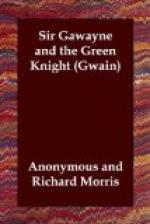[A] With care & wyth kyssyng he
carppe3 hem tille,
1980 & fele þryuande þonkke3 he þrat hom to haue,
& þay 3elden hym a3ay[n] 3eply þat ilk;
[B] Þay bikende hym to Kryst, with ful colde
sykynge3.
[C] Syþen fro þe meyny he menskly de-partes;
1984 Vche mon þat he mette, he made hem a þonke,
For his seruyse, & his solace, & his sere
pyne,
Þat þay wyth busynes had ben, aboute hym
to serue;
& vche segge as sore, to seuer with hym þere,
1988 As þay hade wonde worþyly with þat wlonk
euer.
[D] Þen with ledes & ly3t he wat3 ladde to his
chambre,
& blybely bro3t to his bedde, to be at his
rest;
3if he ne slepe soundyly, say ne dar I,
1992 [E] For he hade muche on þe morn to mynne, 3if
he wolde,
in þo3t;
[F] Let hym ly3e þere stille,
He hat3[1] nere þat he so3t,
1996 [G] & 3e wyl a whyle be stylle,
I schal telle yow how þay wro3t.
[Sidenote A: kissing them sorrowfully.] [Sidenote
B: They commend him to Christ.] [Sidenote C:
He then departs, thanking each one he meets “for
his service
and solace.”]
[Sidenote D: He retires to rest but sleeps but
little,] [Sidenote E: for much has he to think
of on the morrow.] [Sidenote F: Let him there
lie still.] [Sidenote G: Be still awhile, and
I shall tell how they wrought.] [Footnote 1:
wat3 (?).]
[FYTTE the fourth.]
I.
[A] Now ne3e3 þe nw3ere, & þe
ny3t passe3,
Þe day dryue3 to þe derk, as dry3tyn bidde3;
2000 [B] Bot wylde wedere3 of þe worlde wakned þeroute,
Clowdes kesten kenly þe colde to þe erþe,
Wyth ny3e[1] in-noghe of þe norþe, þe naked
to tene;
[C] Þe snawe snitered ful snart, þat snayped
þe wylde;
2004 Þe werbelande wynde wapped fro þe hy3e,
[D] & drof vche dale ful of dryftes ful grete.
Þe leude lystened ful wel, þat le3 in his
bedde,
[E] Þa3 he lowke3 his lidde3, ful lyttel he slepes;
2008 Bi vch kok þat crue, he knwe wel þe steuen.
De-liuerly he dressed vp, er þe day sprenged,
[Fol. 118.]
For þere wat3 ly3t of a lau[m]pe, þat lemed
in his chambre;
[F] He called to his chamberlayn, þat cofly hym
swared,
2012 & bede hym bryng hym his bruny, & his blonk
sadel;
Þat oþer ferke3 hym vp, & feche3 hym his
wede3,
& grayþe3 me sir Gawayn vpon a grett wyse.
Fyrst he clad hym in his cloþe3, þe colde
for to were;
2016 & syþen his oþer harnays, þat holdely wat3
keped,
Boþe his paunce, & his plate3, piked ful
clene,
[G] Þe rynge3[2] rokked of þe roust, of his riche
bruny;
& al wat3 fresch as vpon fyrst, & he wat3
fayn þenne
2020 to þonk;
He hade vpon vche pece,
Wypped ful wel & wlonk;
[H] Þe gayest in to Grece,
2024 Þe burne bede bryng his blonk.
[Sidenote A: New Year’s Day approaches.]
[Sidenote B: The weather is stormy.] [Sidenote
C: Snow falls.] [Sidenote D: The dales are
full of drift.] [Sidenote E: Gawayne in his bed
hears each cock that crows.] [Sidenote F: He
calls for his chamberlain, and bids him bring him his
armour.]
[Sidenote G: Men knock off the rust from his
rich habergeon.] [Sidenote H: The knight then
calls for his steed.] [Footnote 1: nywe (?).]
[Footnote 2: rynke3 (?).]




